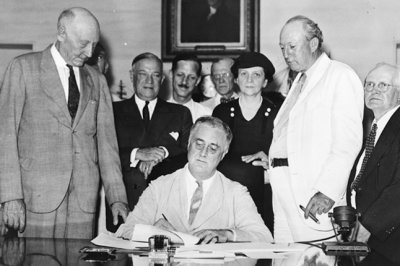Topic: John Galsworthy
John Galsworthy OM (pronounced /ˈɡɔːlz.wɜrði/) (14 August 1867 – 31 January 1933) was an English novelist and playwright. Notable works include The Forsyte Saga (1906—1921) and its sequels, A Modern Comedy and End of the Chapter. He won the Nobel Prize in Literature in 1932.
Galsworthy was born at Kingston Hill in Surrey, England into an established wealthy family, the son of John and Blanche Bailey (nee Bartleet) Galsworthy. His large Kingston upon Thames estate is now the site of three schools: Marymount International, Rokeby Preparatory School and Holy Cross. He attended Harrow and New College, Oxford, training as a barrister and was called to the bar in 1890. However, he was not keen to begin practicing law and instead travelled abroad to look after the family's shipping business interests. During these travels he met Joseph Conrad, then the first mate of a sailing-ship moored in the harbour of Adelaide, Australia, and the two future novelists became close friends. In 1895 Galsworthy began an affair with Ada Nemesis Pearson Cooper (1864—1956), the wife of Maj. Arthur Galsworthy, one of his cousins. After her divorce ten years later, the pair married on 23 September 1905 and stayed together until his death in 1933. Prior to their marriage, they stayed clandestinely in a farmhouse called Wingstone in the village of Manaton on Dartmoor, Devon. From 1908 he took out a long lease on part of the building and made it their regular second home until 1923.
From the Four Winds was Galsworthy's first published work in 1897, a collection of short stories. These, and several subsequent works, were published under the pen name John Sinjohn and it would not be until The Island Pharisees (1904) that he would begin publishing under his own name, probably owing to the death of his father. His first play, The Silver Box (1906) became a success, and he followed it up with The Man of Property (1906), the first in the Forsyte trilogy. Although he continued writing both plays and novels it was as a playwright he was mainly appreciated at the time. Along with those of other writers of the time, such as George Bernard Shaw, his plays addressed the class system and social issues, two of the best known being Strife (1909) and The Skin Game (1920).
It uses material from the Wikipedia article "John Galsworthy."






